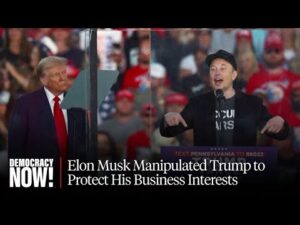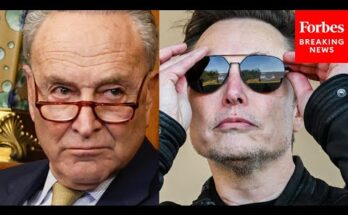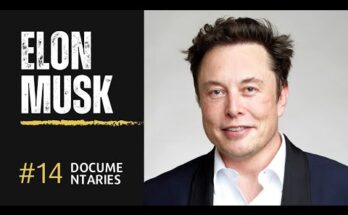
Elon Musk is no stranger to making headlines, whether it’s through groundbreaking technological advancements, his management style, or his vocal stances on policy matters. Among his many public controversies, one of the more contentious issues has been his opposition to various government spending bills. While Musk often positions himself as an advocate for fiscal responsibility and limited government intervention, critics argue that his opposition to such measures often aligns conveniently with his business interests. This dichotomy raises important questions about the motivations behind his political stances and their broader implications for public policy, governance, and corporate ethics.
The Context of Musk’s Opposition
In recent years, Musk has become increasingly vocal about government spending, particularly when it involves significant federal investments in sectors such as renewable energy, infrastructure, and social welfare. For instance, Musk publicly criticized the Inflation Reduction Act, a comprehensive spending bill aimed at addressing climate change, modernizing infrastructure, and boosting economic equity. While the bill contained provisions that directly supported industries in which Musk’s companies operate—such as tax incentives for electric vehicles (EVs) and renewable energy—Musk’s criticism centered on what he described as the inefficiency and overreach of government programs.
Musk’s opposition to government spending bills is often framed as part of a broader libertarian philosophy. He has frequently expressed his belief that private enterprise is more efficient and innovative than government-led initiatives. However, this framing glosses over the extensive history of Musk’s companies benefiting from government subsidies, contracts, and tax breaks. This apparent contradiction has led some observers to label his public statements as a “smokescreen” designed to obscure his underlying business interests.


A History of Benefiting from Government Support
To understand the criticism leveled against Musk, it’s crucial to examine the extent to which his enterprises have relied on public funding. Tesla, for example, has received billions of dollars in federal and state subsidies over the years. These subsidies have taken the form of tax credits for EV buyers, grants for research and development, and incentives for building factories in certain locations. Similarly, SpaceX, another Musk-led venture, has secured lucrative government contracts from NASA and the Department of Defense.
While there’s nothing inherently wrong with companies benefiting from government programs designed to promote innovation and public welfare, the contradiction arises when a beneficiary of such support vehemently opposes further government spending. Critics argue that Musk’s opposition to new spending bills could be strategically motivated to shape policies in ways that disproportionately favor his businesses while limiting competition.
The “Smokescreen” Allegation
The term “smokescreen” implies an intentional effort to mislead or divert attention from the real motivations behind an action. In Musk’s case, critics suggest that his outspoken opposition to government spending is less about principled libertarianism and more about self-serving pragmatism. By positioning himself as a critic of wasteful government spending, Musk can advocate for a regulatory and fiscal environment that minimizes government oversight and maximizes opportunities for private profit.
For example, Musk’s criticism of government inefficiency often coincides with moments when his companies face regulatory scrutiny or when competing firms stand to benefit from new policies. In such cases, his rhetoric can be seen as a way to undermine public support for initiatives that don’t align with his business interests.
Balancing Public and Private Interests
The debate over Musk’s motivations highlights a broader tension in the relationship between public policy and private enterprise. On one hand, private companies like Tesla and SpaceX have undoubtedly driven technological progress in fields that align with public goals, such as reducing carbon emissions and advancing space exploration. On the other hand, the reliance of these companies on public funding complicates the narrative of private-sector efficiency and self-reliance that Musk often promotes.
This tension is emblematic of a larger issue in contemporary capitalism: the role of government in fostering innovation while ensuring that the benefits of public investments are equitably distributed. When public funding disproportionately benefits a few private entities, it raises questions about accountability, fairness, and the proper role of government in the economy.
Musk’s Broader Influence on Policy
Musk’s influence extends beyond his public statements. As one of the world’s wealthiest individuals and a prominent tech entrepreneur, he wields significant sway over policymakers, investors, and public opinion. This influence is amplified by his massive following on social media, where he often uses platforms like Twitter to share his views on a wide range of topics.
Critics argue that Musk’s ability to shape policy discussions creates an uneven playing field. Smaller companies and advocacy groups lack the resources and public profile to counter his narratives, which can skew policy debates in ways that prioritize the interests of billionaires and large corporations over those of the general public. This dynamic underscores the importance of scrutinizing the motivations behind Musk’s political interventions and holding him accountable for the broader implications of his actions.
The Role of Transparency and Accountability
One way to address the concerns surrounding Musk’s opposition to government spending is through greater transparency and accountability. Policymakers, journalists, and the public must critically evaluate the claims made by influential figures like Musk, particularly when those claims have significant implications for public policy. This includes examining the financial and regulatory interests that may underpin their positions.
Transparency also applies to the government programs that support private enterprises. Clear reporting on the allocation and impact of public funds can help ensure that these investments deliver tangible benefits for society rather than disproportionately enriching a select few. Such accountability measures can help build public trust and ensure that government spending aligns with democratic values and priorities.
The Bigger Picture
While Musk’s opposition to government spending bills is a compelling case study, it is part of a broader conversation about the intersection of wealth, power, and public policy. The influence of billionaires on policymaking is a contentious issue in modern democracies, raising questions about the balance of power between elected representatives and unelected private individuals.
Musk’s case illustrates the complexities of this issue. On one hand, his entrepreneurial achievements and vision have undeniably contributed to societal progress. On the other hand, his ability to shape policy debates highlights the need for robust checks and balances to ensure that public interests are not overshadowed by private agendas.
A Call for Nuanced Discourse
The debate over Musk’s opposition to government spending underscores the importance of nuanced discourse in public policy. Simplistic narratives—whether they cast Musk as a hero of innovation or a villain of corporate greed—fail to capture the complexity of his role in shaping contemporary society. A more balanced perspective recognizes both the benefits and challenges of Musk’s influence and seeks to address the underlying issues that contribute to these tensions.
Ultimately, the question of whether Musk’s opposition to government spending bills is a “smokescreen” for his business interests is less important than the broader implications of his actions. By critically examining these dynamics, society can foster a more informed and equitable approach to policymaking, one that prioritizes the common good over individual interests.



